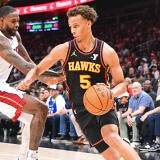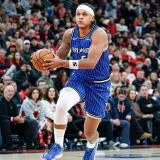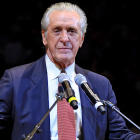Heat's Pat Riley rails against players resting during NBA season: 'It's become a travesty'
The Heat president lets his feelings be known during his end-of-the-season press conference

MIAMI -- Pat Riley isn't too pleased about time off, not for his team and not for players around the league.
He said Wednesday, during a wide-ranging press conference on team and league issues, that he is "pissed" that his team is finished, wishing the Heat had been validated for their remarkable turnaround, from 11-30 to 41-41 -- and particularly frustrated that the Heat lost a playoff tiebreaker to Chicago after the Bulls had more home games (two) than the Heat (one) in their season series.
"We should have had two games in Miami against Chicago," Riley said. "Really. That's ridiculous.... If we played two here, maybe we would be in the playoffs. That should not be part of a tiebreaker when it's head-to-head. It should be equality."
Riley also made his displeasure known about time off in another sense: The time off that players are taking during the season, and what it's doing to the nightly competitiveness in the league at large.
"We don't rest, we don't, I don't believe in it," Riley said. "I think it's gotten to the point where it's become a travesty, an absolute travesty, and blatantly so. I don't care how many players you are resting, or who are the ones who are entitled to get the rest versus who doesn't rest. We don't rest. We maintain players. And obviously, in certain situations, when a guy is playing, you know a guy is playing banged up, only you know that -- then you might shorten his minutes or you might do something. But to just blatantly leave people home and not play them in that situation, I just think it's wrong."
It should be noted that the Cavaliers, with Riley nemesis LeBron James, were among the teams sitting stars. James skipped both games in Miami this season.
"We don't rest players," Riley said. "We maintain them and if a guy can't play, we won't play them."
Why is this a sore point with the Heat? The way the season ended plays a part. On the last night, the Bulls and Pacers edged the Heat from the playoffs by winning against Nets and Hawks teams that were each sitting several key contributors -- the Nets apparently resting guys for offseason rounds of golf. It should be acknowledged, of course, that the Heat benefited from Cleveland and Washington each sitting starters in Miami's last two wins of the season.
Oh, and Riley also knows he bears some responsibility for all of this.
"Now, you're listening to a guy who was the first one who did this in 1982," Riley said. "I don't know if you remember. Portland, last game of the season, I got a call from [Lakers owner] Dr. [Jerry] Buss, and Dr. Buss said 'I'm leaving Kareem [Abdul-Jabbar] and James [Worthy] and Magic [Johnson] home. I said, 'What?!' I think we got fined $10,000."
Riley said his secretary received "500 envelopes from Portland, manila envelopes with their season tickets, demanding their money back from me. So this goes back a long time, but not to the state that it is today. I think Adam Silver [has] got to do something about it, the owners have to do something about it, and let's just put a little more integrity into the whole concept of rest."
Erik Spoelstra, growing up in Oregon, actually attended that game.
"That was a long time ago," Riley said, smiling.
Riley countered a common assumption: that transportation advances have made things easier on players, coaches and staff.
"Private air travel after games is ridiculous," he said. "It's absolutely ridiculous. I mean, getting in at 4 a.m. half the time, and having a game the next night ... I mean, we all go through it, so it becomes a habit. That's one of the reasons why I stopped coaching. I arrived at 5 a.m. in 2003 or something like that from a trip, and my wife had locked me out of the house. 'I'm done with this [bleep]. I'm done with having to open up the door for you at 5 a.m. every morning.'"
He laughed.
"But it's hard," Riley said. "I'd like to go back. Really, I don't remember every feeling the fatigue when I was a player in the [1970s] when we flew commercial. We played the game, we would all show up in the lobby bar, we would have a burger and a beer, we go to bed. You get up at 7 a.m., you get on a plane, you get into town 12 o'clock, you have lunch, you take a nap, you go play the game, you stay overnight, you get a day off in the city, you leave at 2 o'clock. I don't ever remember being that tired back then as a player."
Riley conceded that might have been because Jerry West, Gail Goodrich and Wilt Chamberlain were the ones playing 40 minutes.
"But something needs to be done with all of this," Riley said. "We're doing all this study on REM and sleep and sleep patterns, and I don't know what the answer is, but it's getting harder and harder and harder. But I think all of this monotony and all of this boredom and this mundaneness, even on the faces of the players who are giving up playoff position because they would rather have rest instead of work, I don't know. Someone will come up with the perfect answer as the game continues to evolve."

















